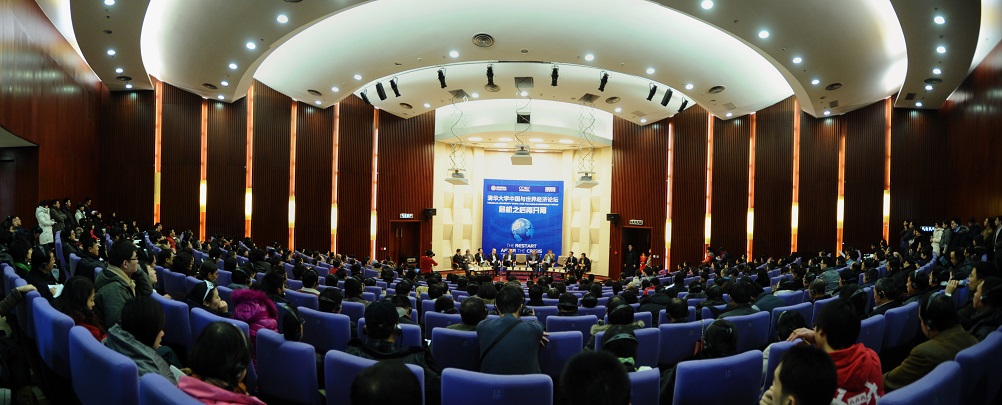
On January 16, 2011, Tsinghua University Center forChinain the World Economy (CCWE) held its sixth forum entitled “The Restart After the Crisis.” The forum focused on challenges that both the world and Chinese economies face following the financial crisis and how Chinese policy makers can navigate through such a complicated international environment in order to allow the economy to continue to develop at a healthy pace. Professor David Daokui Li, Director of CCWE and Member of the State Monetary Policy Committee, moderated the forum.
Forum panelists included: Yao Jingyuan, Chief Economist, National Bureau of Statistics of China; Wang Yiming, Deputy Director, Research Institute of Macroeconomics, National Development and Reform Committee; Yuan Gangming, Senior Research Fellow, CCWE and Chinese Academy of Social Sciences; Lei Dingming, Professor, Department of Economics, HKUST; Chen Yunfeng, Secretary-General, China Economic Union; Declan Kelleher, Ambassador to China, Embassy of Ireland; Ardo Hansson, Chief Economist, World Bank China Office; Jonathan Anderson, Senior Global Emerging Market Economist, UBS; and Chen Jinrong, Analyst, Standard & Poor’s (S&P).
Overall, the panelists agreed that the world economy has continued to experience gradual improvement following the financial crisis. At the same time, China, which was able to emerge from the financial crisis in a much better position than many other economies, can learn many lessons from those countries who were greatly impacted in order to avoid a similar outcome in the future. Ambassador Kelleher stressed the importance of quality as opposed to quantity for economic growth, citing the consequencesIrelandis suffering as a result of moving from economic growth mainly based on high-tech development to growth that was in large part driven by real estate speculation. In addition, other panelists warned that allowing credit to expand too quickly and not containing property lending and property markets have historically gotten emerging markets into trouble.
The forum also featured many viewpoints about the economic futures of the world andChina, particularly for 2011, the first year of the Twelfth Five-Year Plan. The panelists were in agreement that the world economy would continue to see steady improvement and also agreed with most forecasts thatChina’s GDP will grow slightly slower than recent years but will still maintain a healthy rate. However, in contrast to what many around the world believe, the Chinese economy faces many long-term challenges that need to be monitored very carefully. The most prominent of these challenges is the continued soaring price of real estate and the potential of a bubble burst. In addition, inflation and global pressure on the appreciation of the RMB will continue to be challenges forChina. Furthermore, it was widely agreed upon that domestic consumption will continue to play an increasingly larger role and ultimately will become the driving force ofChina’s economy.
The forum also saw the release of the most recent economic report jointly produced by CCWE and HKUST Center for Economic Development. The report analyzes the performance ofChina’s economy in 2010 and forecasts the economy for 2011, covering GDP, CPI, M2 supply, import and export and fixed asset investment. The report predicts thatChinawill experience a GDP growth rate of 9.5%, a modest slowdown from the 10% growth experienced in 2010, while at the same time, CPI will remain at a high level of 3.9%. M2 will grow by 17.9%, slower than 2010, which saw a growth rate of nearly 20%. The growth rate of exports will decrease to 20.9% while the growth rate of imports will remain relatively steady at 33.3%. In 2010, the trade surplus in terms of percentage of GDP decreased to 3.2% and will then decrease to around 1% in 2011. Fixed asset investment will see its growth rate remain relatively high at 26.9%.
As a timely and effective platform, Tsinghua University has and will continue to invite extraordinary policy makers, experts and business leaders, domestic and international, to address current and long-term Chinese domestic issues amidst the international political and economic environment. The objectives of the forum are both to brainstorm/inform and to provide a good basis for policy debate and recommendations.





